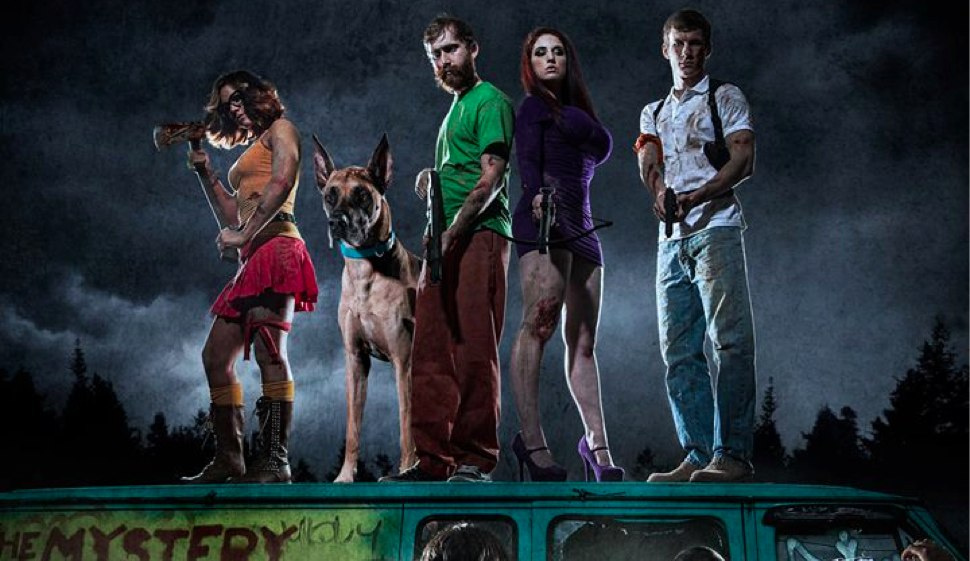
They’re All Scrappy Now.

Haunting the Web Since 1999


By way of Hold Fast, archaeologists discover evidence of a paleolithic skull-smashing culture in ancient Syria. Expect Cavemen v. Zombies imminently.
I haven’t been keeping up on this lately, but casting has been filling out for Frank Darabont’s adaptation of Robert Kirkman’s zombie-epic The Walking Dead, starting this October on AMC. Joining the shamble are Andrew Lincoln (as Rick Grimes), Sarah Wayne Callies (Lori), Jon Bernthal (Shane), Jeffrey DeMunn (likely Dale), Steven Yuen (Glenn) and, the most recognizable face, Laurie Holden — nee X-Files‘ Maria Covarrubias — as Andrea.
In very related news, please do keep in mind that May is Zombie Awareness Month. “Supporters of Zombie Awareness Month wear a gray ribbon to signify the undead shadows that lurk behind our modern light of day. From May 1 through May 31, Zombie Research Society Members and friends take this small step to acknowledge the coming danger.” Awareness!

So, what’s the rumpus? Well, after a quick breakdown of the rules of surviving said zompocalypse (For example, “Rule 1: Cardio…Fatties die first“), Zombieland basically follows the travails of five of the last humans on Earth. There’s:
Also, it’s hard to escape the nagging sensation that this movie is basically just Shaun of the Dead for mooks. This feeling isn’t helped by the earlier-mentioned Family Guy-isms, or the Beavis-and-Butthead-y “I like breakin’ things!” messaging of the middle-going. (Sometimes it’s not even Fleischer’s fault — On its own, the slo-mo credit sequence is good, imaginative fun, but it also can’t help but recall the very similar Watchmen opening, which then involuntarily brings to mind the current mook-King of Hollywood, Zack Snyder.)
Lemme put it this way: Throughout the movie, the previously-established Zombie Rules — “Beware of Bathrooms,” “Double-Tap,” “Don’t be a Hero” — will flash up on the screen whenever they become pertinent. This often gives Zombieland the feel of the introductory levels — “Press X to jump” — of a not-very-interactive xBox game. And, while I can’t say I had a bad time at Zombieland, it’s hard to shake the sense that that 81 minutes would’ve been much better spent at home, playing Left 4 Dead. Now there’s a zombie-killing quartet I can get behind
“Instead, constructivists would posit that the zombie problem is what we make of it. That is to say, there are a number of possible emergent norms in response to zombies. Sure, there’s the Hobbesian ‘kill or be killed’ end game that does seem to be quite popular in the movies. But there could be a Kantian “pluralistic anti-Zombie” community that bands together and breaks down nationalist divides in an effort to establish a world state.“
Following up on this recent mathematical modeling study confirming the dire global ramifications of a zombie outbreak (naturally, the talk-radio right remains unconvinced), Daniel Drezner ponders the responses of various IR schools to World War Z. “Now, some would dispute whether neoconservatism is a systemic argument, but let’s posit that it’s a coherent IR theory…clearly, neoconservatives would argue, zombies hate us for our freedom not to eat other humans’ brains.“
“This is not about zombies popping out of closets. This is a story about survival, and the dynamics of what happens when a group is forced to survive under these circumstances. The world (in ‘Walking Dead‘) is portrayed in a smart, sophisticated way.” Don Draper and Walt White, meet the Zombie Apocalypse: Apparently, AMC is close to contracting Frank Darabont to oversee, and Gale Ann Hurd to produce, a television series from Robert Kirkman’s The Walking Dead. Clever, clever — I’d watch it. (And let’s hope they use the most recent mathematical modeling to keep things on the up-and-up.)
“While one can certainly use zombies to express all kinds of ideas, I would argue that at heart, the genre is a progressive one…Surviving the tide of zombies requires community and mutual responsibility. What could be more progressive than that?” In The American Prospect, Paul Waldman ruminates on the political economy of zombie flicks. It is true, we on the Left tend to be more interested in braaaains… (Via FmH.)
In the trailer bin of late: Rachel McAdams gets another notebook, wherein she keeps up with the comings and goings of future husband Eric Bana, in the new preview for Robert Schwentke’s The Time-Traveler’s Wife. (I haven’t read the book, but was hoping this movie would seem more sci-fi and less rom-com.) Robin Williams finds the Dead Poets Society life considerably less appealing after two decades in the red band trailer for Bobcat Goldthwait’s World’s Greatest Dad. (Definitely maybe.) And Jesse Eisenberg and Woody Harrelson take more than a few pages from Shaun of the Dead in the new trailer for Ruben Fleischer’s Zombieland. It’s looking missable.
Some fun links by way of other quality blogs:

I found this exchange particularly funny: “Gates told reporters he may have gotten off on the wrong foot with the new president, citing an occasion when Obama asked him what he knew about 1984’s Secret Wars, a 12-issue limited Marvel release. Gates then handed a visibly confused Obama 1,400 classified pages on covert CIA operations in El Salvador. Later, the defense secretary attempted to find common ground with Obama by making casual references to the comic book Spawn. But the 44th president reportedly brushed him off with an abrupt laugh, saying, ‘no one in [his] administration likes Spawn.‘”
Well, sorry to hear of the dilemma, Mr. President. Perhaps (*cough cough*) hiring some progressive-minded fanboys (fanboy-minded progressives?) might’ve alleviated the situation…



If you didn’t catch 28 Days Later, no worries: The eerie prologue of this film, which takes place back in the early days of the “Rage Virus” outbreak, will give you the basic gist. We begin with a couple (Robert Carlyle of Trainspotting, Catherine McCormack of Braveheart) holed up in an English cottage somewhere in the countryside, counting their canned goods and waiting, with a handful of other survivors, for the storm to pass. But, pass it doesn’t, and soon enough the virus, which turns one almost instantly from well-meaning human to ferocious, bloodthirsty monster (Think the Black Smurfs. Gnap!), is extant in the cottage, and tough split-second decisions must be made. Flash-forward to 28 weeks later, as this couple’s two children (Mackintosh Muggleton, Imogen Poots) — thankfully at summer camp in Spain during the outbreak — are returned to the “Green Zone” of a nearly-empty London. England’s capital, as it turns out, is now being run and reconstructed by the United States Military, under the auspices of a no-nonsense Gen. Stone (Idris Elba, a.k.a. Stringer Bell. No Slim Charles around, tho’, which is too bad for everyone else.) Life proceeds somewhat normally in the Emerald City, thanks to the watchful eyes of army snipers such as the Cpl. Hicks-ish Doyle (Jeremy Renner of Dahmer) and savvy military doctors such as Scarlett (Rose Byrne of Troy.) But, partly due to an ill-advised expedition by the children to their old home — you just knew somebody was going to do something stupid — the Rage Virus breaks loose in London again, and the American military presence finds that really drastic actions may be necessary to win the worldwide war on zombies…
Reconstruction, an American occupation gone horribly wrong, Green Zones irrevocably infected by viral terror from the surrounding areas…I don’t really need to draw a map, do I? Still, one of the strengths of Fresnadillo’s 28 Weeks Later, like BSG and the best in sci-fi social commentary, is that it doesn’t really align to any easy 1-1 reading of current events. When the US army stops distinguishing between zombie and civilian and shoots at will, or firebombs the city in an attempt to stem the outbreak (not a huge spoiler — it’s a major selling point in the trailer), it’s hard not to grimace ruefully and think of other occupations-gone-bad in our recent history. Yet, things aren’t so simple here: One of the things I admired most about this very dark film is its sheer remorselessness. From its opening moments and throughout, it instills a visceral fight-or-flight dread in the audience and refuses to let us off the hook, inviting us less to tsk-tsk about the hubris of American military overreaching and more to ponder what measures — moral, immoral, amoral — we might take to ensure our own survival in this nightmarish universe. Time and time again in 28 Weeks Later, compassion is absolutely the wrong answer to the problem at hand, and — though there’s less of this as the characters crystallize into horror-movie stereotypes over the course of the film — people surprise you with the decisions they choose to make with their backs to the wall. Maybe the scariest thing about Fresnadillo’s film — and the zombies are at times pretty damn scary — is its dark take on human nature, and what it ultimately suggests about the usefulness of good intentions under extreme pressure. To wit, they’re not very useful at all — if anything, they’re the road to Hell on Earth. So before you offer that helping hand, the relentlessly grim 28 Weeks Later suggests, buy some good running shoes.